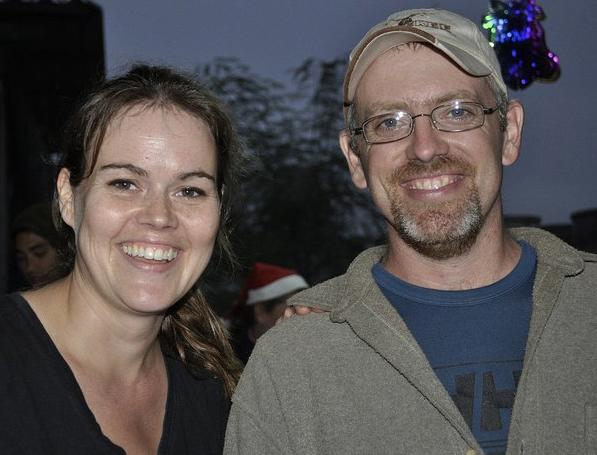Briercrest grad finds life's calling in helping the people of Burma

Matt Fetters thought he was going to go into youth work until an assignment for a missions class changed the course of his life.
The Briercrest College and Seminary alumnus, along with his wife and three daughters, has spent the last six years in Thailand serving with Partners Relief & Development, an organization that works with communities impacted by the war in Burma (also called Myanmar). Fetters works with the Karen people, an ethnic group that lives primarily in the southern and south-eastern parts of Burma.
“They’ve had over 60 years of civil war,” Fetters explained. “It’s a little bit like Hitler – the ethnic Burman people are trying to wipe the other ethnic groups off the planet. It’s slow genocide. They won’t go in and kill everybody in a village very often – sometimes they do – but most of the time they won’t. They just shoot.”
The area of Burma where this slow genocide is happening is known as the Black Zone, or what the government calls the resistance area.
“It’s actually (the government) trying to shove the Karen people out of the country or kill them,” Fetters said. “They’ll come in and attack a village – lob mortars in where there are women and children. After they’ve bombed it, they’ll come in with ground troops. If they see someone, they can shoot them.”
“Because it’s constant resistance, there’s half a million to a million Karen people hiding in the jungle at any given moment,” he continued. “My main mission here is to do relief and development with the Karen people that have been displaced.”
Less than 10 years ago Fetters was focusing on a different mission – finishing his college degree at Briercrest.
“I had to do an interview for a missions class,” Fetters remembered. So I contacted Steve Gumaer, the founder of Partners Relief & Development.”
Gumaer had attended Fetters’ home church in Fairbanks, Alaska – Friends Community Church – years ago. The church strongly supports his organization, so he was a natural choice for Fetters’ interview.
“Steve told me maybe I should try missions instead of being a youth minister,” Fetters said. “In the back of my mind I was always rolling around ‘Is that something God might want us to do?’”
Fetters and his wife Liz investigated this further.
“We had saved money for a tenth year anniversary cruise,” Fetters said. “Instead of going on a cruise, we decided we would go check out Thailand and pray and see if that was the next step for us. Kids games I guess it was!”
Most of Fetters’ work is in sustainable development for the Karen people.
“Right now, we’re just finishing the construction of a training centre out where all the migrant workers are,” he said. “We’re focusing on animal husbandry and agriculture kind of technology – bringing back organic stuff and getting away from chemicals.”
One of Fetters most recent projects has been an early warning system for Karen villages that are the most vulnerable for attack.
“Before, they didn’t really have any warning,” Fetters explained. “They wouldn’t really know anything was happening until the first mortar dropped, or the first gun was fired. So usually that meant grabbing as many children as you could reach and running. They would lose all their belongings most every time.”
“So we designed a system of a solar set that would charge batteries for long-range two way radios and we trained them how to set up solar panels, how to maintain a system, (and) how to charge a battery sight. They use these radios; they have sentries posted in the jungle outside of the villages so that when they see troops moving they can warn the villagers.”
The early tests of this system seem promising.
“One of the villages where we did the pilot program for this early warning system got attacked 16 times in two months,” Fetters said. “Not a single person was killed.”
Fetters is also helping to see that a hydro-electric generator is installed at a high school in Burma.
“It’s the only high school in that part of Burma that can give a twelfth grade education and prepare kids for college,” he said.
Fetters is honest about his family’s assignment in Thailand.
“It’s good. It’s always difficult,” he explained. “It’s definitely not somewhere we would choose to live if God kind of gave us a choice. But we really feel called here . . . definitely to the people of Burma. They really have been dealt a hard hand to play. It’s not easy for them. It’s a really bad situation where the government has caused division and strife among everyone. The only thing that would really bring peace is if the government collapsed in on itself.”
Although Fetters can see some fractures in the structure of Burma’s government, he explains how it supplies such a large foot army.
“They have some 70,000 child soldiers,” he explained. “Most of them have been stolen from bus stops or they’ve been sentenced because they didn’t have their I.D. and got caught, so they’ll send them to boot camp and send them out to the jungle. So there’s really nobody in the whole country that’s not a victim except the high-ups in the government.”
Burma’s grim situation makes it easy for the Briercrest alum to say what he hopes his work will help to empower.
“Freedom for the people of Burma,” he exclaimed. “Freedom would definitely be something to pray for.”
